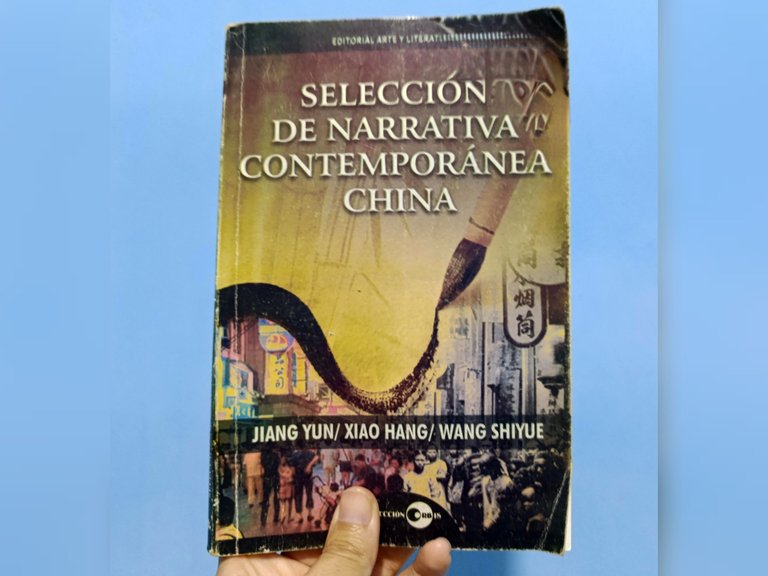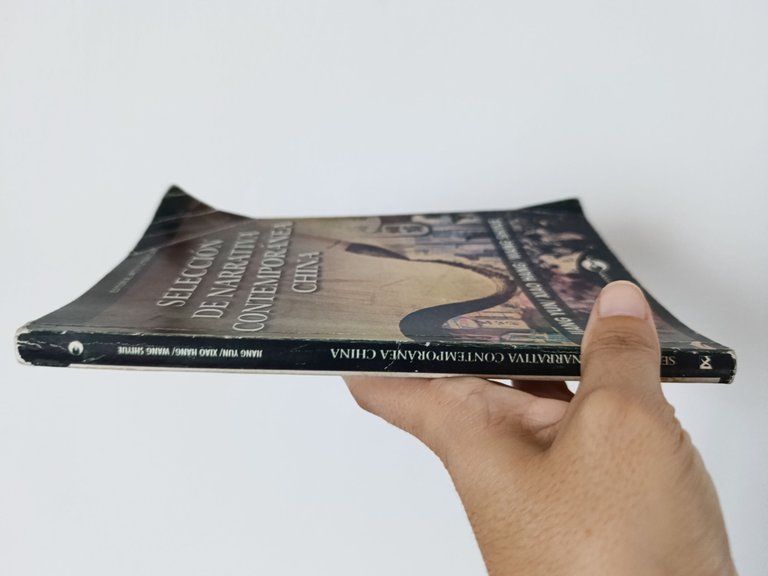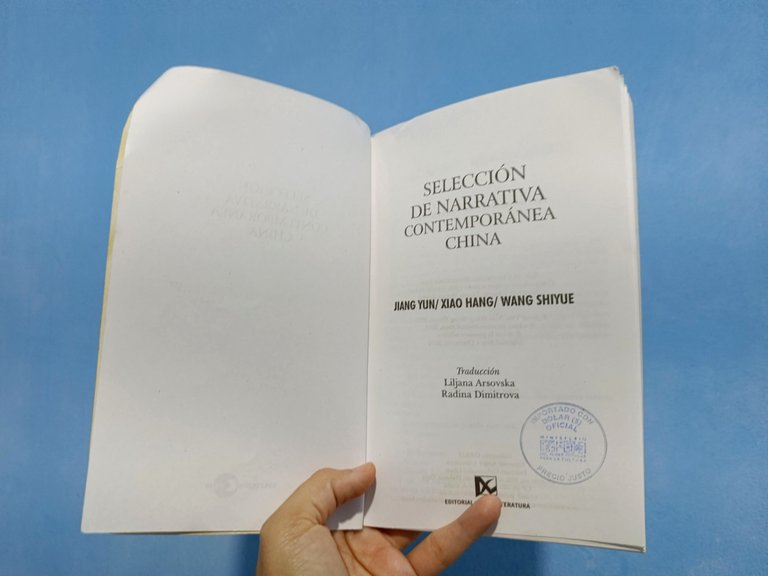Ever since I began my studies in Literature, I have been attracted to investigate the different cultures represented in works of fiction. Once I heard the expression "Don't come with a Chinese story" and I set out to find out why. It turns out that, in fact, the Chinese literary tradition is characterized by extensive narratives where historical events, geography, mythology and feelings are mixed, being the substance left in the background to privilege descriptions, in contexts where the exaggeration is evident and the verisimilitude questionable.
This is how I faced the reading of The Most Beloved Tree, a short novel by the Chinese writer Jiang Yun, with which she won the "Lu Xun" literary prize in 2006. The narrative is organized in 9 chapters and has a conventional aesthetic proposal for the Chinese tradition. Furthermore, in this edition, the references are explained at the foot of the page, which is a bit invasive as they can occupy more than half of the space stipulated for typography.

Set during the war with Japan, the Second Sino-Japanese War, which began in 1937, the story introduces us to Meiquiao, who begins the novel as a 16-year-old girl. About 40 years will pass in terms of chronology from the beginning to the denouement. For this reason, we will find references to what happened in China until 1965, also, the narration will offer us religious beliefs, traditions and gastronomic customs, which shows us a broad and detailed panorama of the culture of the great Asian country.
As the reading progresses, one notices that this is another sample of women's literature, at first the narrative focus is held by Meiquiao and then, from the second half, it is transferred to her daughter Lingxiang. Both suffer many misfortunes throughout their lives, justifying a strong criticism of the social impositions of China at that time, where women were seen as unfeeling beings, whose main objective was to bring children into the world and obey their husbands, a relationship that in many cases was negotiated for family convenience.
The teenager Meiquiao marries Mr. Da, a widower who was the director of the city's pedagogical school. Before the wedding she made a condition: she wanted to continue her university studies to finish her pedagogical career. She was a free and rebellious soul, while he was rigid, serious and old-fashioned, a relationship that was incompatible, but which also led to the birth of four children: Lingxiang, Linghan, Lingshuang and Lingtian.

Although Mr. Da is a powerful man, including each child has its own wet nurse, Meiquiao never wanted to be known as "the master's wife". The discomfort reached such a level that after the birth of her first daughter, she tried to abort the other pregnancies, which is why she shows no love for these three offspring. Married life and motherhood lead Meiquiao to a deep depression, her longing is to become a teacher and, in addition, to become a painter. Mr. Da, seeing her serious condition, allows her to study and then practice her profession.
Later Meiquiao falls in love with Xi Fangping, a student of Mr. Da, and decides to leave her husband and children. From this lovers' elopement, Meiquiao leaves the scene and cedes the absolute narration to Lingxiang, who by then is eight years old, both mother and daughter had established a special affectionate bond, unlike the rest of her siblings.
At the age of 16, Lingxiang begins to search for her mother to claim for her abandonment, she was a student who went on an adventure in the middle of the war with the Japanese. Author Jiang Yun describes here a Japanese bombardment against a cargo ship (carrying smuggled travelers) where only Lingxiang manages to survive, a poignant scene because it reflects the brutality of the invaders against unarmed students, while the young girl questions the reasons for taking such risks, coming to think that dragging hatred and grudges for the past and seeking revenge cannot be a motivation to live.

The most beloved tree is not an easy work to assimilate because it seems to lean towards a script to produce a soap opera. The themes and the narration are oriented to touch the reader's heart, lengthening the events until they lead to the climax scene which would be the meeting between mother and daughter, the absence of eight years is settled with both looking into each other's eyes, with the expectation of what will happen with this pending account. Healing internally was always the goal.
Then the story takes another leap and Lingxiang is 37 years old, a university professor, married with two children. The ending surprised me a bit as it highlights that supreme kindness has no reward. Forgiveness is a great value when it manages to invade the soul and evicts bitterness. Hence, it is necessary to let go of past grudges and always be free to live to the fullest.
Versión en EspañolDesde que inicié mis estudios en Literatura he sentido atracción por indagar en las diversas culturas representadas en las obras de ficción. Cierta vez escuché la expresión "No vengas con un cuento chino" y me propuse averiguar el por qué de ello. Resulta que, en efecto, la tradición literaria china se caracteriza por extensas narraciones donde se mezclan sucesos históricos, geografía, mitología y sentimientos, siendo lo sustancial dejado en segundo plano para privilegiar las descripciones, en contextos donde lo exagerado es evidente y la verosimilitud cuestionable.
De esta forma afronté la lectura de El árbol más querido, novela corta de la escritora china Jiang Yun, con la cual ganó el premio literario "Lu Xun" en el año 2006. La narración se organiza en 9 capítulos y posee una propuesta estética convencional para lo que es la tradición china. Además, en esta edición, las referencias son explicadas al pie de página, resultando un poco invasivas ya que pueden ocupar más de la mitad del espacio estipulado para la tipografía.

Ambientada en el conflicto bélico con Japón, Segunda Guerra Sino-Japonesa, que inició en 1937, la historia nos presenta a Meiquiao, quien inicia la novela como una joven de 16 años. Van a transcurrir unos 40 años en lo que respecta a la cronología desde el comienzo hasta el desenlace. Por tal razón, encontraremos referencias a lo ocurrido en China hasta el año 1965, también, la narración nos ofrecerá creencias religiosas, tradiciones y costumbres gastronómicas, lo que nos muestra un panorama amplio y detallado de la cultura del gran país asiático.
A medida que avanza la lectura se advierte que se está ante otra muestra de literatura femenina, al principio el foco narrativo lo posee Meiquiao y luego, a partir de la segunda mitad, se transfiere a su hija Lingxiang. Ambas padecen muchas desventuras a lo largo de sus vidas, justificando una fuerte crítica hacia las imposiciones sociales de China en aquel entonces, donde la mujer era vista como un ser sin sentimientos, cuyo objetivo principal era traer hijos al mundo y obedecer al esposo, relación que en muchos casos era negociada por conveniencia familiar.
La adolescente Meiquiao se casa con el Señor Da, hombre viudo que era director de la escuela pedagógica de la ciudad. Antes de la boda ella le pone una condición: quería continuar sus estudios universitarios para terminar su carrera pedagógica. Ella era un alma libre y rebelde, en cambio él alguien rígido, serio y anticuado, una relación incompatible, pero que de igual manera originó el nacimiento de cuatro hijos: Lingxiang, Linghan, Lingshuang y Lingtian.

Si bien el señor Da es un hombre poderoso, inclusive cada niño tiene su propia nodriza, Meiquiao jamás quiso ser conocida como "la esposa del maestro". El malestar llegó a tal nivel que tras el nacimiento de su primera hija, ella intentó abortar en los otros embarazos, razón por la cual no demuestra amor hacia esos tres descendientes. La vida matrimonial y la maternidad llevan a Meiquiao a una profunda depresión, su anhelo es convertirse en profesora y, además, ser pintora. El señor Da viendo su grave estado le permite estudiar y luego ejercer su profesión.
Posteriormente Meiquiao se enamora de Xi Fangping, un alumno del señor Da, y decide abandonar a su esposo y a sus hijos. A partir de esta fuga de amantes, Meiquiao sale de escena y cede la narración absoluta a Lingxiang, quien para entonces cuenta con ocho años, tanto madre como hija habían establecido un vínculo afectivo especial, a diferencia del resto de sus hermanos.
Al cumplir los 16 años, Lingxiang inicia la búsqueda de su madre para reclamarle por su abandono, era una estudiante que se lanzó a la aventura en medio de la guerra con los japoneses. La autora Jiang Yun describe acá un bombardeo japonés contra un barco de carga (que trasladaba viajeros de contrabando) donde solamente Lingxiang logra sobrevivir, escena conmovedora porque refleja la brutalidad de los invasores contra estudiantes desarmados, en tanto la joven cuestiona las razones para asumir tales riesgos, llegando a pensar que arrastrar odio y rencores por el pasado y buscar venganza no puede constituirse como una motivación para vivir.

El árbol más querido no es una obra fácil de asimilar porque parece inclinarse hacia un guión para producir una telenovela. Los temas planteados y la narración se orientan a tocar el corazón del lector, alargando la consecución de los sucesos hasta desembocar en la escena cumbre que sería el encuentro entre madre e hija, la ausencia de ocho años se salda con ambas mirándose a los ojos, con la expectativa de lo que sucederá con esta cuenta pendiente. Sanar internamente siempre fue el objetivo.
Luego el relato da otro salto y Lingxiang tiene 37 años, es profesora universitaria, casada y tiene dos hijos. El final me sorprendió un poco pues se resalta que la bondad suprema no tiene recompensa. El perdón es un gran valor cuando logra invadir el alma y desaloja a las amarguras. De allí que sea necesario soltar los rencores del pasado y siempre ser libres para vivir a plenitud.
✓Photos from my personal gallery, edited with Fotocollage.
✓Text translated with DeepL.
✓Fotos de mi galería personal, editadas con Fotocollage.
✓Texto traducido con DeepL.
